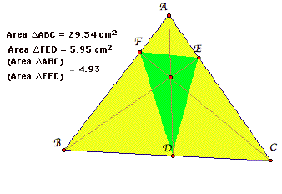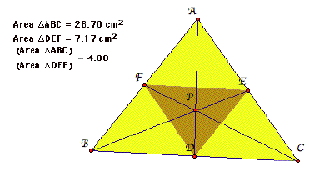Final assignment
By
Na Young Kwon
A. Consider any triangle ABC. Select a point P inside
the triangle and
draw lines AP, BP, and CP
extended to their intersections with the
opposite
sides in points D, E, and F respectively.
Explore AF*BD*EC and FB*DC*EA for various
triangles.


a scalene triangle
a right triangle


an
isosceles triangle an
equilateral triangle
We check the case that a point P is outside of a triangle, centroid, incenter and
circumcenter.




We check the value ![]() and
and ![]() for a right triangle, isosceles triangle
and
for a right triangle, isosceles triangle
and
equilateral triangle, and
various location of P. Then we find an interesting
point that the value of![]() and
and ![]() is equal.
is equal.
B. LetÕs set a conjecture with investigations.
<Conjecture>

<Proof>
To prove it we construct the
parallel lines for each side of a triangle
and call the intersection points
p1,p2,p3,p4,p5 and p6 .
See the following picture.

We will use the property of the
parallel line and similar triangles.
At first, we change the given
expression ![]() .
.
Multiple Pp1,Pp2,Pp3,Pp4,Pp5
and Pp6 to denominator and numerator,
and change the expression like
the following:
![]()
 ----------(A)
----------(A)
Here, the value of ![]() is 1.
is 1.
We can know this value from
the following:

1) DCAF ¼ DCp3 P ->
CF:CP=FA:Pp3
2) DCBF ¼ DCp6P
-> CF:CP=FB: Pp6
From 1) and 2) we know FA: Pp3 =FB: Pp6 ,that is, AF× Pp6 =BF× Pp3.
Similarly, we can know BD× Pp2 =CD× Pp1 and CE× Pp4 =AE× Pp3 .
So, the expression (A) is changed with
the following.

![]()
![]() ----------(B)
----------(B)
To find this value (B) we will
also use the similar triangles.

Since DPp1p4 ¼ D p2Pp5 ,
we know Pp1 : Pp2= Pp4 :p2p5 .
Thus ![]()
![]() .
.
Similarly, from the fact that DPp6p3 ¼ D p5Pp2, we know ![]()
![]() .
.
So the value of (B) ![]()
![]()
![]()
![]()
![]()
![]()
![]() .
.
Hence we proved our conjecture ![]() .
.
From this proof, we can know the value of ![]() is 1 for an arbitrary point P .
is 1 for an arbitrary point P .
C.
Show that when P is
inside triangle ABC, the ratio of the areas of
triangle ABC and
triangle DEF is always greater than or
equal to 4.
When is it equal to
4?
See
the following picture.

In
this case we can see the result of the ratio of the areas of DABC and D DEF
is
greater than 4. I found when the point P is a centroid, the ratio is equal to
4.

We can prove this using the definition and property of
the centroid .
When point P is a centroid, BC // EF and ![]()
![]()
![]() .
.
So an area of triangle AEF is 1/4 of an original
triangle.
An area
of D FBD and D ECD is 1/4 of an area of DABC for each
because a point D is a midpoint of a segment BC. Thus
an area of DDEF
is 1/4 of an area of original triangle.
ÉÉÉÉÉÉÉÉÉÉÉÉÉÉÉÉÉÉÉÉÉÉÉÉ